On the PCT (Pacific Crest Trail) I hiked in running shoes. Almost immediately, my feet started to hurt. Excruciating pain, every hour sometimes I would have to stop and rub them back to life. The pain was from the ball of my foot. Even though I bought 12 different pairs of shoes on my hike, I could never find anything that relieved the pain. If I hadn’t had 20 years of dreaming behind me on hiking that trail, I don’t think I could have stayed on. After I got back, it was probably a month before I could even get up and walk to the bathroom without shoes on. When I would go out for walks, after an hour my feet would start to hurt and go numb again. I thought my hiking days might already be over.
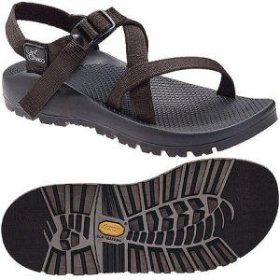 The day before heading out to Thailand a bought a pair of Chaco Z/1 sandals; they are hiking sandals with an orthopedic foot bed. When I got off the plane I walked for hours through Bangkok; it’s not a pleasant place to walk but I was so happy that my feet didn’t hurt that I just kept walking.
The day before heading out to Thailand a bought a pair of Chaco Z/1 sandals; they are hiking sandals with an orthopedic foot bed. When I got off the plane I walked for hours through Bangkok; it’s not a pleasant place to walk but I was so happy that my feet didn’t hurt that I just kept walking.
Since then I have hiked only in Chaco sandals. On the AT (Appalachian Trail), we referred to them as strap on boots, so sturdy is the foot bed. Here are some things I know about hiking in Chaco sandals.
Wear socks: Your feet will probably never be tough enough to wear Chacos for very long without socks; not wearing socks is nice every once in awhile but if I would keep them off for very long, I would get blisters and sores where the straps rubbed my feet, also with out socks my feet would get dried out and crack, the neoprene socks are particularly helpful to prevent cracks as they keep your feet moist. I tried the waterproof socks and found that they stunk so much that even among hikers I was a bit of a leper. Even after washing, they stunk. After a week, I threw them away.
Snow. In the snow, or when it was cold, I wore neoprene socks; still my feet were cold and uncomfortable and the snow would build up under my toes. More then anything I think it is psychologically uncomfortable for me to walk in the snow in sandals. The longest I have continuously walked in snow, was 12 miles in 6 inches of new wet snow. My feet were fine but I was worried.
Chacos can be resoled. I did get one pair resoled but then, after awhile, the straps broke. Therefore, if you are going to have them resoled I would recommend having the straps replaced too. When my strap broke, I taped my sandal to my foot with electrical tape and hiked for three days like that until I could get a new pair sent to me.
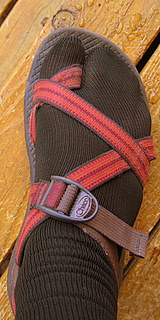 The Chacos with the toe strap. I hiked the AT and the Florida trail in the Chacos without the toe strap; since then I have switched to the ones with the toe strap: the Z/2. I like hiking with the toe strap, my feet stay warmer and the ice doesn’t build up under my toes in the snow as bad. I wear them with tabi socks. I think there now may be some neoprene socks available with the split toe but I don’t have a pair so when I want to hike in neoprene socks I have to step on the toe strap. Comfort wise it’s fine but the problem is that if you hike stepping on the toe strap too much it becomes impossible to pull the toe strap back out without the help of a pair of pliers. Update: After about 500-700 miles on my latest PCT hike, a callus developed between my toes and I had to switch back to the Z1 style.
The Chacos with the toe strap. I hiked the AT and the Florida trail in the Chacos without the toe strap; since then I have switched to the ones with the toe strap: the Z/2. I like hiking with the toe strap, my feet stay warmer and the ice doesn’t build up under my toes in the snow as bad. I wear them with tabi socks. I think there now may be some neoprene socks available with the split toe but I don’t have a pair so when I want to hike in neoprene socks I have to step on the toe strap. Comfort wise it’s fine but the problem is that if you hike stepping on the toe strap too much it becomes impossible to pull the toe strap back out without the help of a pair of pliers. Update: After about 500-700 miles on my latest PCT hike, a callus developed between my toes and I had to switch back to the Z1 style.
 Make your own toe socks. Brawny on her backpacking site, http://www.trailquest.net/, gives these instructions for making your own tabi toe socks: “Make a straight mark (with a felt tip pen or marker) on the socks between the big toe and second toe. Then sew a “V” shaped seam on either side of the pen mark, and then make a cut on the straight pen mark.”
Make your own toe socks. Brawny on her backpacking site, http://www.trailquest.net/, gives these instructions for making your own tabi toe socks: “Make a straight mark (with a felt tip pen or marker) on the socks between the big toe and second toe. Then sew a “V” shaped seam on either side of the pen mark, and then make a cut on the straight pen mark.”
Cracks. In addition to wearing socks, you might find that you need to file down the dry skin and put some grease into your feet and put them in plastic bags or neoprene socks to heal them. Bag balm works really well, but is hard to find on the trail. Carmex is available at most places. Also if you have petroleum based neosporin, that will work as well. Brush on super glue works wonders, but is only a temporary measure—eventually you have to take care of your feet.
Sizing. It’s important to have just the right size so that your feet fit the orthopedic foot bed right. You can get them in wide sizes for both men and women. I have heard of people who bought them extra long because they were afraid of stubbing their toe and they ended up not happy with them. I’ve never stubbed my toe in them, even though my toes go right up to the end. I have had sticks poke me from the side, but it just hurts for a moment and I got good at tuning out those assaults.
The NRS Neoprene Sandal Socks w/ HydroCuff is the best neoprene sock I have found. They come plenty big so you can wear a warm sock under them.
note: Joe over at Zpacks has worn sandals in blizzards in Colorado. He wears waterproof socks—maybe if I had worn regular socks under them I wouldn’t have had a problem or maybe he had better waterproof socks then me.
Related post: Stalking the elusive split toe tabi sock
Cracked feet
Brush on super glue
 is a great book on freeing yourself up financially and getting your priorities clear.
is a great book on freeing yourself up financially and getting your priorities clear.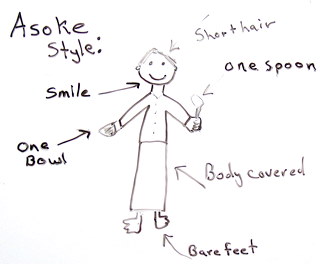 When I got there the next day, I found not really a village but an intentional community that was a little perplexed as to why I was there. They however gave me a place to sleep, introduced to me the English-speaking nun, fed me, and asked me where I wanted to work. I could chose from the herbal medicine shop, the mushroom farm, the fruit and vegetable gardens, the sewing shop, the dump, or compost making. I choose the herbal medicine shop. 2 months later, I was still there and loving it. I taught English and worked in the herbal medicine factory. The people were all so nice to me. I thought it was a wonderful place to live. The village stressed simplicity. There were two meals a day but you were supposed to try to only eat once a day. If you were only eating once a day the people would say, “Oh, very good.” You were supposed to be up a 4 am and you weren’t supposed to take a nap during the day. You were also supposed to go barefoot.
When I got there the next day, I found not really a village but an intentional community that was a little perplexed as to why I was there. They however gave me a place to sleep, introduced to me the English-speaking nun, fed me, and asked me where I wanted to work. I could chose from the herbal medicine shop, the mushroom farm, the fruit and vegetable gardens, the sewing shop, the dump, or compost making. I choose the herbal medicine shop. 2 months later, I was still there and loving it. I taught English and worked in the herbal medicine factory. The people were all so nice to me. I thought it was a wonderful place to live. The village stressed simplicity. There were two meals a day but you were supposed to try to only eat once a day. If you were only eating once a day the people would say, “Oh, very good.” You were supposed to be up a 4 am and you weren’t supposed to take a nap during the day. You were also supposed to go barefoot.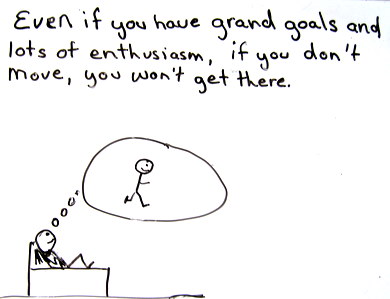
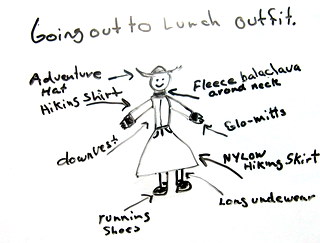 would notice.
would notice.
 For a toothbrush, I carry the lightest child’s size toothbrush I can find. I keep it in a plastic flip top sandwich bag. This ensures that it doesn’t get dirty, while in my
For a toothbrush, I carry the lightest child’s size toothbrush I can find. I keep it in a plastic flip top sandwich bag. This ensures that it doesn’t get dirty, while in my 
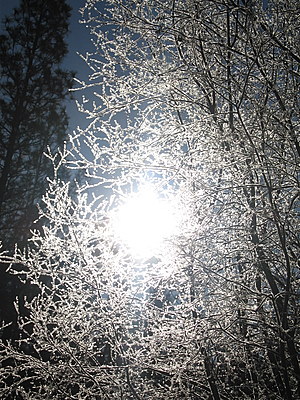
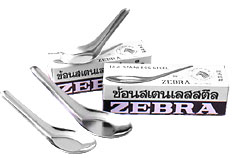
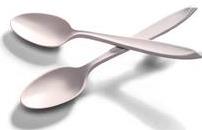
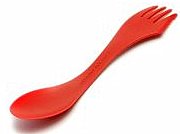
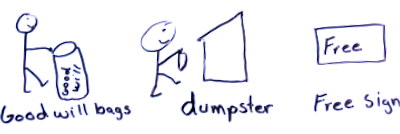
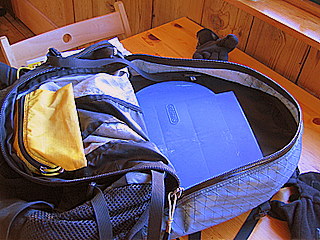 Since my last trip with my propane tank in my backpack was so painful, this time I thought I would try to improve things. I ripped the plastic lid off of a bin and put that in the inside of the pack against my back. It worked great and I was able to walk the seven and a half mile loop down to the little store, up the road to my mailbox, and then back up to my cabin without any problem. The plastic lid made my backpack more supportive and kept the propane tank from poking me in the spine.
Since my last trip with my propane tank in my backpack was so painful, this time I thought I would try to improve things. I ripped the plastic lid off of a bin and put that in the inside of the pack against my back. It worked great and I was able to walk the seven and a half mile loop down to the little store, up the road to my mailbox, and then back up to my cabin without any problem. The plastic lid made my backpack more supportive and kept the propane tank from poking me in the spine. The day before heading out to Thailand a bought a pair of
The day before heading out to Thailand a bought a pair of  The Chacos with the toe strap. I hiked the AT and the Florida trail in the Chacos without the toe strap; since then I have switched to the ones with the toe strap: the
The Chacos with the toe strap. I hiked the AT and the Florida trail in the Chacos without the toe strap; since then I have switched to the ones with the toe strap: the 